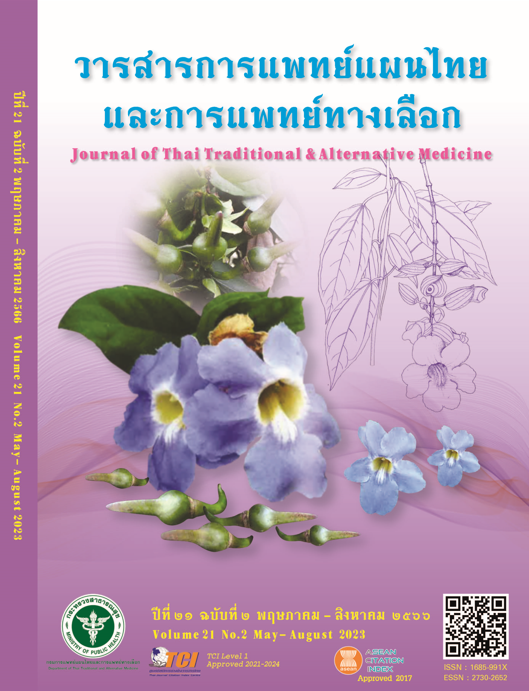A Retrospective Study on Efficacy of Thai Herbal Formulas for Treating Chronic Insomnia in Phunphin Hospital, Surat Thani Province
Main Article Content
Abstract
Introduction and objective: This retrospective study aimed to demonstrate the efficacies of Thai herbal formulas used for chronic insomnia treatment in Phunphin Hospital, Surat Thani province, from 2020 to 2022.
Methods: The study involved a sample of 50 purposively selected patients with insomnia. Three groups of them regularly received each of Thai herbal formulas: Ya Sukkhasaiyat, cannabis oil (Deja formula), and Yahom Thephachit. Then, five parts of data of insomnia patients including personal factors, history on herbal formula use for insomnia, sleep quality (Pittsburgh Sleep Quality Index: PSQI), stress level records (ST-5 scores), and depressive disorder screening data (2Q scores) were evaluated at baseline and one month after treatment.
Results: Part 1, of all participants, most of them (78%) were female, 64% were > 60 years old, 38% had a normal BMI, 32% had diabetes and hypertension, and 64% exercised by brisk walking. Part 2, regarding the use of herbal drugs for insomnia, the efficacies of Ya Sukkhasaiyat, cannabis oil (Deja formula), and Yahom Thephachit were not significantly different in treating insomnia (P > 0.05). Part 3, after herbal therapies, the sleep quality was significantly better with the average PSQI score dropping from 10.06 to 5.20 (P < 0.001). Part 4, after taking herbal medications, the average stress level (ST-5 score) decreased significantly (P < 0.001). Part 5, after taking herbal medications, the average depression level (2Q score) slightly decreased, indicating no significant efficacies of the herbal drugs in reducing depression (P > 0.05).
Discussion: Thai herbal formulas including Ya Sukkhasaiyat, cannabis oil (Deja formula), and Yahom Thephachit were effective for the treatment of chronic insomnia which conformed to other previous studies.
Conclusion and recommendation: Thai herbal formulas are efficacious for the treatment of chronic insomnia. However, a prospective randomized controlled trial should be conducted to confirm the efficacy of herbal treatments; so they might be used as alternative remedies for chronic insomnia.
Article Details

This work is licensed under a Creative Commons Attribution-NonCommercial-NoDerivatives 4.0 International License.
References
Department of Mental Health, Ministry of Public Health. World sleep day: Insights into insomnia problems. [internet]. 2021 [cited 2021 Dec 12]; Available from: https://www.dmh.go.th/news-dmh/view.asp?id=30646. (in Thai)
Tengtermwong N. Effectiveness and safety of Suk Sai-Yad herbal remedy for chronic insomnia: A preliminary retrospective study in Chao PhyaAbhaibhubejhr Hospital. J Thai Trad Alt Med. 2022;19(2):331-43. (in Thai)
Jennifer HW, Kathleen JM, Tim R, Kevin M, Nigel M, Melissa JR, David RH, Peter RE. Treating insomnia symptoms with medicinal cannabis: a randomized, crossover trial of the efficacy of a cannabinoid medicine compared with placebo. Sleep Research Society. 2021;44(11):1-8.
Kitiyamat S. Effect of YahomThepajit recipes on the quality of sleep in older people with insomnia [Master of Science Thesis]. Chiang Rai: Mae Fah Luang University; 2015. (in Thai)
Strategy and Policy Subdivision, Phunphin Hospital. Population in Phun Phin District. 2022. p. 1-22.
Panyachetthanon K. Hour of relaxation. Bangkok: National Geographic Magazine (Thai version). 2019. (in Thai)
Chaiarj S, Panya P. Insomnia and related factors. The Thai Journal of Nursing Council. 2012;20(2):1-12. (in Thai)
Jirapramukpitak T, Tanchaiswad W. Factors predicting sleep quality among nursing students. Journal of the Psychiatric association of Thailand. 1997;42(3):123-32. (in Thai)
Department of Mental Health, Ministry of Public Health. Guidelines for the use of mental health tools for health personnel in community hospitals (Chronic Disease Clinic). 2nd ed. Bangkok: Printing Cooperative of Thailand; 2015.
Arunpongpaisal S, Anakewit N. The use of cannabis extracts for patients with mental health problems. Journal of the Department of Medical Services. 2019;44(1):7-9. (in Thai)


